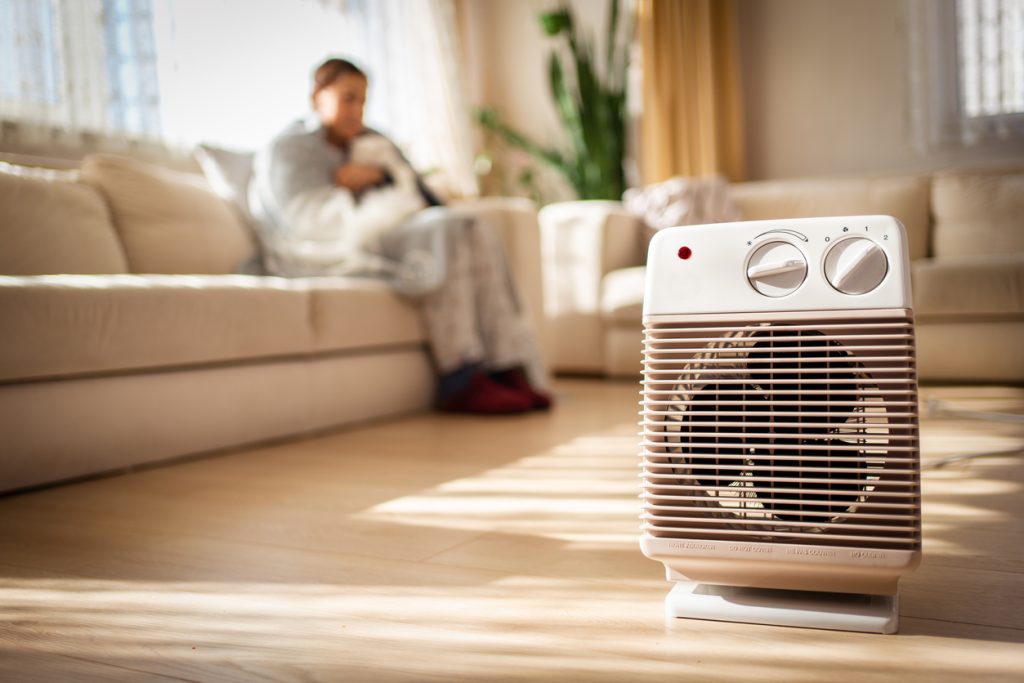
Check out our latest products
As the winter chill sets in, maintaining a cozy indoor environment becomes a top priority. While bundling up in layers is one option, a portable electric heater could be the perfect solution to keep your space comfortably warm this season.
Like any appliance, portable electric heaters come in a variety of models and sizes, with different features. We’ve put together a guide to make it easy for you to choose your next portable heater and use it safely.
Heaters are classified based on how they generate heat. Your choice will depend on your heating needs:
- Panel heaters could be wall-mounted or freestanding, and may include fans.
- Radiant heaters generate warmth by heating oil within the unit, though the oil doesn’t need to be refilled.
- Fan heaters distribute heat from an element using a fan.
- Ceramic heaters use a ceramic heating element and may also use a fan to spread heat.
- Infrared heaters generate heat from a surface within the heater. The heat is emitted in the form of infrared energy.
What you need to consider
Sorting through all of your options for an electric heater could take until summer. Knowing how you’ll use the heater will help you narrow your choices. Here are three questions to consider:
Will you be using the heater for temporary personal heat or to keep a room steadily warm? The size and type of heater, and the size of the space you’re trying to heat, will be factors.
Do you need instant heat, or can the heat be generated gradually? Keeping your feet warm under your desk at work for a few hours will call for a different solution than making sure guests stay warm overnight in a chilly bedroom.
What’s your noise tolerance? Any heater with a fan will generate some level of sound. An in-store demonstration will help you decide what’s appropriate.
Heater features
Personal electric heaters offer a number of features for operation, safety and heat distribution. They might include:
- A thermostat to keep the heat at a steady temperature. Some models offer a digital setting.
- Oscillation to distribute heat
- Adjustable fan speeds
- Some types of heaters may employ additional safety features, including automatic shutoff if the heater tips over, cool-touch housing, child locks, or motion sensors that automatically turn the heater off if anything gets too close.
Portable heater safety
There are a number of steps you should take to heat your home safely, regardless of the style of heater you choose:
- Purchase a heater that is safety certified, meaning it has been tested by a Nationally Recognized Testing Laboratory. Look for a safety certification mark on the packaging or the heater.
- Never leave a heater unattended when it is being used and always unplug heaters when they are not being used.
- Do not use a heater with a power strip or extension cord. Overheating of a power strip or extension cord could result in a fire.
- Avoid placing anything on top of the cord, including furniture, as it could damage the cord. String cords out on top of area rugs and carpeting.
- Keep combustible materials, including furniture, pillows, bedding, papers, clothes and curtains, at least three feet away from the front, sides and rear of the heater.
- Keep flammable materials, such as gas and paint, away from the heater.
- Do not use heaters in wet or damp areas unless they are designed for bathrooms or outdoor use. Moisture may damage heaters not designed for this.
- Periodically check the plug and outlet for a secure fit. The outlet may need to be replaced if the plug does not fit snugly or if the plug becomes very hot. Consult with a qualified electrician to replace the outlet.
- Don’t plug any other electrical device into the same outlet as the heater. It could result in overheating.
- Keep children away from heaters and do not place one unattended in a child’s room.
- Place heaters on a flat, level surface. Only use heaters on table tops when specified by the manufacturer. Do not place your heater on furniture. It could fall, dis¬lodging or breaking parts in the heater.
- To reduce the risk of hyperthermia, which can be fatal, do not leave space heaters operating unattended in a confined space around infants or individuals with reduced sensory or mental capabilities.
Have a warm, cozy winter. You’ll be looking for air conditioners before you know it. (And if you want to get an early start on AC shopping, we have you covered.)
Subscribe to the AHAM Consumer Blog














